
As a business owner, you know that knowledge is power. And even if you don’t own a business, you must have heard that phrase before, right? Very few things empower a business and its team more than a comprehensive pool of organized and well-structured information. This, when online, is typically called a knowledge base – a tool that allows your team or your customers to easily fetch the information they need, exactly when they need it.
In today’s fast-paced and digital environment, having a knowledge base is more important than ever. With increasing competition and rapidly evolving technology, businesses need to find new ways to stay ahead of the curve and meet the needs of their customers. By providing a knowledge base, organizations can offer their users a self-service option that is available 24/7, which will definitely lead to faster resolution times and increased client satisfaction.
In this blog post, we’ll explain what a knowledge base software is, how your organization can benefit from it, and provide tips for implementing knowledge base software for your organization. Also, we’ll let you know what to look for in a knowledge base and provide you with a list of the best knowledge base systems available.
What is a Knowledge Base Software?
A knowledge base software is an application that helps businesses create, manage, and share company knowledge online, whether it be internally or externally. Knowledge base solutions typically offer features such as document management, search and collaboration tools. Furthermore, knowledge base software sometimes offers or integrates with other tools and business applications, such as customer support live chat, a project management tool, shared inbox for support agents, ticketing systems, customer relationship management (CRM) and enterprise resource planning (ERP) systems, among others.
Think of a knowledge base tool as a parent’s brain. In the same way that parents know where everything is, when everything was purchased, the names of the kids’ teachers and classmates, the children’s schedules, knowledge base software provides a business with a centralized repository of information.
Jokes aside, with customer support software becoming increasingly important among online businesses, companies can now manage and store their knowledge and information in a variety of ways, making it versatile and accessible to users. For example, businesses create both private knowledge bases for internal use and public knowledge bases for customer-facing support. And that’s precisely why knowledge management software has become so popular in recent years, because it offers business owners and team members a number of key advantages over traditional ways of storing information.
Since there are a variety of knowledge base tools available, each with its own focus, benefits and drawbacks, it’s important to choose the right knowledge base software that will meet your company needs. So keep on reading to learn more about the best knowledge base software tools and how to choose the right one for your business.
Types of Knowledge Base Software
We can talk about different types of knowledge bases depending on how we use and implement them. There are help centers, corporate wikis, information hubs, second brains, SOP repository, internal knowledge bases, external knowledge bases — the list is quite lengthy. However, when talking about knowledge base tools for companies, team members and users/customers, the most common way to categorize them is into external and internal knowledge management systems.
External Knowledge Base
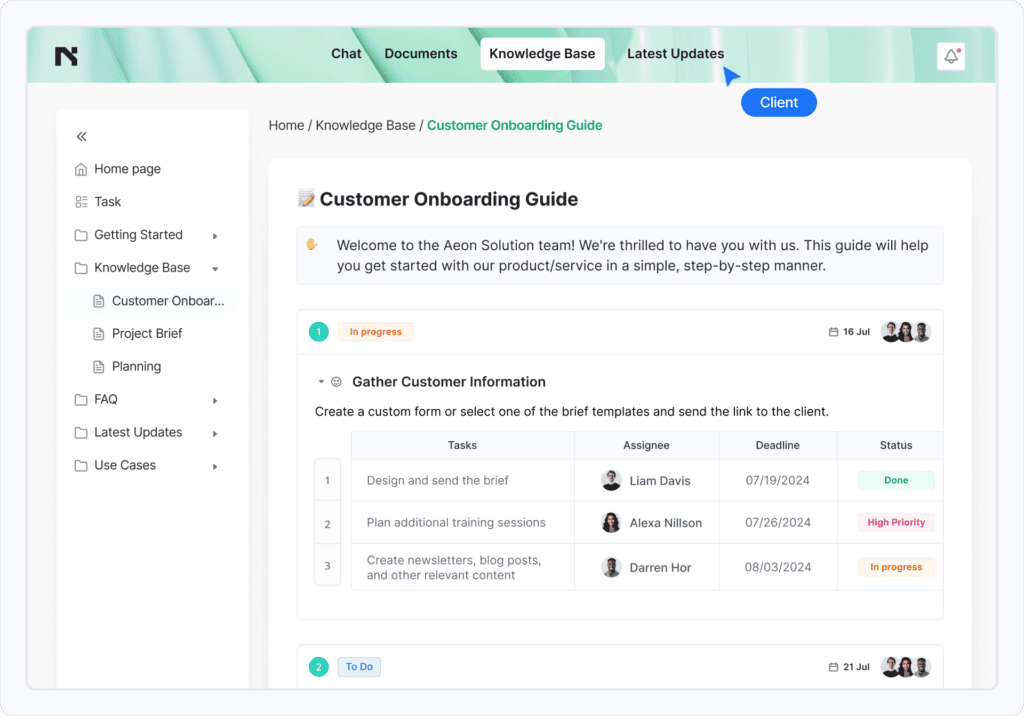
An external or public company information hub, also called a self-service knowledge center, is a platform created by a business and available publicly to their customers, users or potential clients.
As you can guess from the name, this type of platform is set up so that customers or users can easily find the up-to-date information they need in order to solve a particular problem or query they have, without the need to contact the customer support team directly. This helps reduce unnecessary customer service emails and calls, and can improve customer satisfaction quite effectively.
Internal Knowledge Base
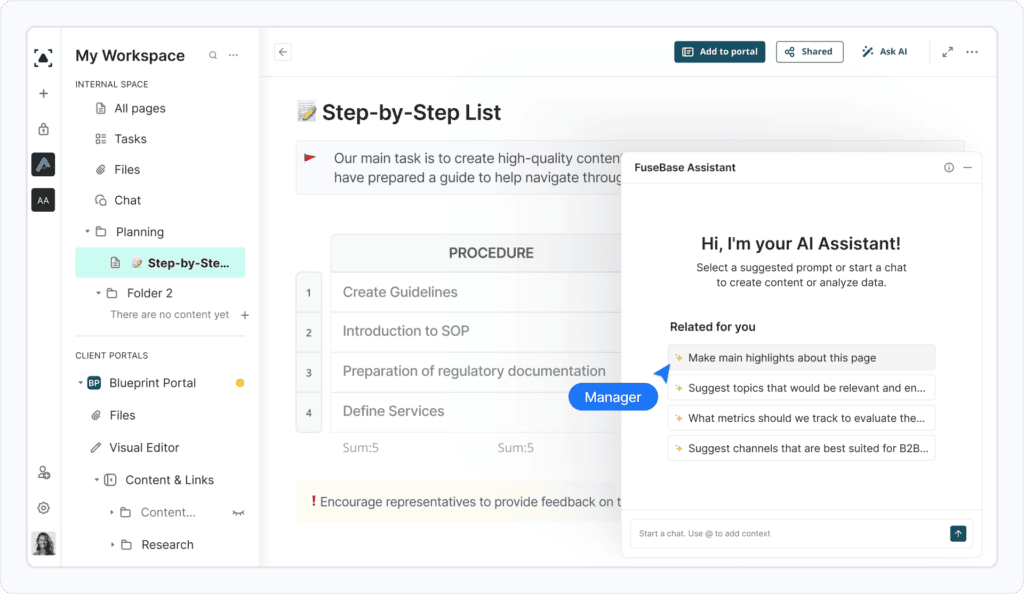
An internal knowledge base is a compound of structured information which is only available to a company’s staff, that is, internally, sometimes as part of a corporate intranet. The reasons for creating an internal knowledge base can be quite varied: improving employee onboarding, centralizing SOPs for business processes, solving customer queries more quickly and keeping track of updates. It can also help team coordination within a company as various departments can share best practices or learn from each other’s experience.
The importance of those is difficult to overestimate, and internal knowledge base software is becoming extremely popular today as it provides organizations with a centralized repository of up-to-date information and expertise to improve employee productivity, streamline processes, and support effective decision-making.
What Is a Self-Service Knowledge Base?
This kind of knowledge base comprises a centralized repository of information and expertise that enables its users to find answers to their questions and troubleshoot issues on their own, without needing to contact a superior or a support agent. A self-service information base typically includes articles, FAQs, and other resources that users can access at any time to get the information they need to use a product or service effectively. By providing employees and customers with access to a self-service documentation center, businesses can reduce the number of support requests they receive, improve interactions with customers, improve employee productivity, and free up resources to focus on other important tasks.
The Key Benefits of Having a Knowledge Base
Centralize information
The days of emailing documents and PDFs around the office or relying exclusively on Google Docs or Microsoft Teams are long gone, or at least they should be! In today’s business world, knowledge management is key and knowledge management systems provide a centralized place to share and access information.
Knowledge base software makes it easier for everyone in an organization (or outside it!) to find the information they need, whenever they need it, without having to store it offline as Word or PDF documents which are easily lost and difficult to keep updated.
Improve customer experience and retention
By creating valuable and informative how-to articles for your knowledge base, you help your customers feel like your company cares (because you do!) and like they are getting real value for their money (which they are, right?).
Providing helpful tips and support consistently and on a regular basis by means of a knowledge base software platform ensures that every customer feels welcome and cared for – something that will surely make them stay loyal to your business!
Besides, when you provide awesome self-service resources within a knowledge base, you are ultimately educating your customers, which will result in a smoother experience for them when dealing with your products or services.
Save time and money
Customer self-service is one of the best ways for businesses to improve customer satisfaction, but it also saves significant amounts of time and effort for support agents and translates into tangible financial benefits for the company.
By allowing customers to access the information they need exactly when they need it, your company can free up valuable resources that could be better spent on other things (like paintball days and tacos for the team!). That’s where a knowledge base hits the stage.
Improve team efficiency
While efficient team communication is essential in any organization, the less need there is to spend time communicating, the better. We’re sure all of the introverts out there will agree, right? But in all seriousness, the less time we spend in meetings, writing internal emails, chatting and so on, the more time we can spend selling our products or providing our services successfully. That’s where a self-service knowledge base is invaluable.
Connect internal silos
The term “silos” in a business refers to the separation or grouping of employees, usually by department or team, due to their skills or role within a company. While this separation seems logical, it can sometimes keep knowledge from flowing freely between departments, which can lead to inefficiencies and missed opportunities.
By implementing a knowledge base software, a company can break down these internal barriers between departments, and teams can work more efficiently supporting each other better to achieve common goals.
Retain company knowledge
Skills are almost specific to individuals in certain roles and almost non-transferable — this isn’t The Matrix — but knowledge doesn’t have to be. You can take advantage of your employes’ specialized expertise by creating a detailed company information and service hub with documentation and informative knowledge base articles. This is extremely important to prevent your company from losing access to valuable and essential employee know-how. That way, your knowledge base, which in fact comprises the company’s second brain, grows over time and so do its chances of success.
15 Reasons Why You Need a Knowledge Base Software
If you’re a business owner and are still wondering why you might need a knowledge management system, here are our top 15 reasons why you should definitely start using a knowledge base in your business:
- A knowledge base facilitates team collaboration by allowing internal users to work concurrently on the same or different documents. When integrated effectively into a company’s workflow, an internal knowledge base tool can significantly improve productivity and bring more value than even the most efficient managers combined.
- A knowledge management platform boosts business productivity because, once the support tickets have been created, staff can simply look up the relevant articles to find the information needed to do their jobs.
- A well-customized knowledge base improves customer satisfaction thanks to how-to articles. Customers will be able to conveniently find the answers to their questions and solutions to their problems.
- A knowledge base tool is an effective way to reduce the burden on a support team and improve customer satisfaction by providing customers with easy access to solutions for their problems, freeing up support agents to handle more complex inquiries. Self-service for the win!
- A comprehensive knowledge base solution makes it easier to scale your support. Your support service can become more effective at training new agents, which will make your team grow more easily.
- A knowledge base makes it easier to onboard new employees. By creating a central service hub of internal company documentation, new employees (regardless of the department) can be trained more easily and can find the help they need without nagging their colleagues.
- Dedicated knowledge base software boosts your company’s image and perception. A strong and informative center can make your company look more authoritative and position it above the competition in the same field.
- Knowledge management solutions can be a great ally of your SEO content strategy. Indexable support articles can be a great source of organic traffic, both for brand and non-brand search keywords.
- An online knowledge base gives users the chance to give you direct feedback. If you use a solution with a user feedback feature, you can get to know how your KB visitors feel about your support articles, which is especially useful to find blind spots and knowledge gaps in your services and products as well as your documentation.
- Knowledge base systems that provide support in multiple languages can help your company expand its reach and better serve a diverse global customer base, resulting in improved customer satisfaction and reduced support costs.
- A comprehensive knowledge base can help you build a community around your product or service. Some knowledge base software solutions offer forum-like platforms where visitors can ask and respond to questions, interacting with one another.
- A knowledge base system helps you to organize and keep track of your company’s knowledge. By keeping an updated information center, you won’t lose sight of your company’s growth and know-how progress.
- Knowledge base software provides your team with valuable usage data and actionable insights. Usage analytics will help your team identify information gaps and new opportunities to generate valuable content for your customers.
- A knowledge management solution can provide your company with a simple way to create, manage and share valuable information between team members and departments, and with your customers.
- A properly customized knowledge base system will allow you to create a hub of searchable articles containing all your company’s FAQs, product information and whatever else you want to throw in there!
Isn’t that more than enough to start using knowledge management software, like, right now?
Essential Features of Knowledge Base Software
Content creation and management: The ability to create, organize, and edit articles is a core feature of knowledge base software. This includes options for adding images, videos, and other multimedia to articles, as well as tools for organizing articles into categories and subcategories.
Rich customization options: Most knowledge base software offers customization options, such as the ability to brand the knowledge base with a company logo or color scheme, choose from different templates or themes, and customize the layout and design of the knowledge base.
Search functionality: Knowledge base software typically includes robust search features that allow users to search for specific articles or keywords and then filter and sort results.
User management and access control: Knowledge base software typically offers user management and access control features, allowing administrators to set user permissions and access levels. This feature ensures that sensitive information is only accessible to authorized users.
Analytics and reporting: Analytics and reporting features are common in knowledge base software and enable administrators to track usage and performance metrics, such as the number of views or searches on specific articles. This information can help businesses identify trends and areas for improvement.
Integration options: Knowledge base software may integrate with other tools or software, such as customer relationship management (CRM) software, chatbots, or help desk software. Integration options allow organizations to streamline workflows and provide a seamless experience for users.
Customer support and documentation: Knowledge base software typically includes customer support features, such as email support or live chat. It may also include documentation and resources for getting started with the software, such as user manuals or tutorials.
How to Choose the Right Knowledge Base Software
There are many knowledge base software solutions to choose from, and it can be difficult to decide which one is right for you, your team and your business. However, with a little research and understanding of your needs, goals and budget, you can easily find the best knowledge management software for your business. So here’s a little help from us: the key factors you ought to consider when choosing a knowledge base software.
Your budget
As we will see later on in this article, the prices of knowledge base software range from extremely affordable to “I’d rather drown in support emails than pay that amount.” So knowing exactly how much you are willing (or able) to spend is probably the wisest first step when choosing the right information center software for your company. Otherwise, you might get a major scare or two when you come across the price tags of some platforms’ paid plans.
Just a knowledge base?
A knowledge base nowadays allows you to do a lot more than simply creating and managing information hubs. So you need to determine the following things first:
- Will your team need to be able to communicate internally by means of a chat?
- Do you need your knowledge base to have live chat support?
- Do you need a CRM as part of your knowledge base solution?
- Does your knowledge base need to be a white label?
- Do you need email notifications for updates or changes to the knowledge base?
- Does your support team need not only a knowledge base but also project management features and collaboration tools on the same platform?
Search box and usage analytics

There’s no doubt that the search function is an essential part of any knowledge base software. An internal search engine will help users find what they’re looking for quickly and easily, which is why this feature is especially important when creating an external knowledge base for your customers or website visitors.
Besides the search functionality, some knowledge base software also provides usage data such as search queries. This can provide you with actionable insights to modify or create more relevant articles to better cater to your customers’ queries.
Ease of use
How easy or difficult the knowledge base software is to use will determine your success when implementing and adopting a self-service knowledge center. You don’t want to spend hundreds of dollars on an internal knowledge base only to find that your team is still using Word documents and PDFs because of the steep learning curve of the newly adopted knowledge base. We’ve seen it happen… Also, imagine triggering customers’ frustration simply because they can’t navigate your documentation easily. That would be a mess! Intuitive knowledge base software is an essential tool for any organization looking to streamline support processes, reduce customer effort, and improve overall customer experience.
Hosted vs Self-hosted
Self-hosting your own knowledge base can be a great solution for business owners who want to have complete control over it. Self-hosted solutions like a WordPress help center plugin are usually affordable, but come with some disadvantages, such as having to manage and update the knowledge base yourself.
On the other hand, hosted knowledge base software solutions, that is, platforms that handle the hosting and software for you, are more convenient if you can afford the pricing and don’t mind your content being hosted on a different company’s servers, among other things.
EXPERTS SAY:
“It all depends on the amount of knowledge that needs safeguarding, how many people need to access it, and how sensitive that information is. The needs would vary wildly for an international team of hundreds of people that happen to be handling customers’ financial information, than for a small team that publishes a blog and just keeps a spreadsheet with the contact info of their sources or freelance writers.
As you get more complex, you’re better off using knowledge base software or developing a tool in-house and hosting it on your own servers, if that’s possible. Based on my research, most companies would buy a tool that has some sort of security certification like SOC.
Any sort of data repository is better than having to ask colleagues time and time again for certain info or documents.“

Artificial intelligence and machine learning
AI and machine learning are two buzz words in today’s SaaS world, which can sometimes be devoid of real meaning. However, when it comes to knowledge base software, machine learning and artificial intelligence can help your business provide better customer experience and streamline some of your business processes. However, it will obviously come at a cost, and for many small/medium businesses, it will probably not be worth it.
Flexibility and scalability
Flexibility in any software you decide to implement is important because you never know how your business is going to grow or change over time. You might start out with a small team of employees, but as your business grows, you might need to add more users or change the way your knowledge base is organized. A flexible knowledge management system will be able to accommodate those changes without any problems.
Customization
Customization is also important because it allows you to tailor your knowledge base software to your specific needs. For example, if your company offers different products or services, or even if it operates under different brands, you might want to create separate hubs for each one so you can have a different look and feel for each base.
Is SEO important for your business?
If you’re creating a self-service knowledge base, you probably want to use it to grow your organic traffic. Why not take advantage of your content to attract more visitors organically? If this point is important to you, choose a knowledge base solution that offers at least basic SEO settings which will make it easy for your knowledge base articles to start ranking in search engines.
Who Can Benefit From Using Knowledge Base Software?
Businesses of all types can benefit from intuitive knowledge base software tools. They make it easy to create, manage and find information you or your customers need. Here are a few examples of platforms or businesses that can benefit from using a knowledge management platform:
- SaaS companies: Canva has a help center for its millions of monthly users. Can you imagine how many thousands of support contacts they prevent by having those help articles?
- Retail platforms: AppSumo has a help center for buyers who have questions about their purchases, accounts, etc. Also, Amazon has loads of help centers for different purposes, but theirs are accessible only when you’re logged in.
- Local and national authorities: Official government authorities also have information hubs for their citizens, such as New York City and its NYC Business platform.
- Large enterprises and SMBs: Even small and medium businesses with or without a strong online presence can reap the benefits of a customer-facing knowledge base: internal knowledge bases can streamline employee training and support while external knowledge bases can improve customer interaction.
The Top 11 Knowledge Base Software Platforms
We’ve already talked about the benefits of knowledge bases, and the things you need to consider to choose the right software to build one. So now it’s time to dive into our carefully curated list of the best knowledge base software platforms. We’re sure one of these will make you, your team and customers very happy.
FuseBase

Best for: Internal documentation, content creation, team and client collaboration
Price: from $32 per team
FuseBase provides users with a powerful solution for knowledge sharing and creating an information hub for your team, which can be used to create a self-service portal. With a note-management-like approach, FuseBase makes it easy to create any type of knowledge base article thanks to its powerful editor and rich embedding feature. Whether for external or internal purposes, from blog posts to SOPs or company wikis, FuseBase is suitable for all sorts of knowledge management efforts.
You can see an example of a customer-facing knowledge base and help center articles here.
Pros
- Affordable pricing.
- White label solution.
- Customer portal.
- Powerful editor.
- Project management features.
- Simple sharing.
- Easy internal collaboration.
- Internal chat solution.
- Supports mark down.
- Nested folders and subfolders.
- Rich embedding feature & integrations.
- AI-powered search feature.
Cons
- Folders and notes cannot be reordered manually.
- No SEO settings such as meta title, description or friendly URLs..
🤖 Watch how FuseBase AI Agents transform your work:
Notion
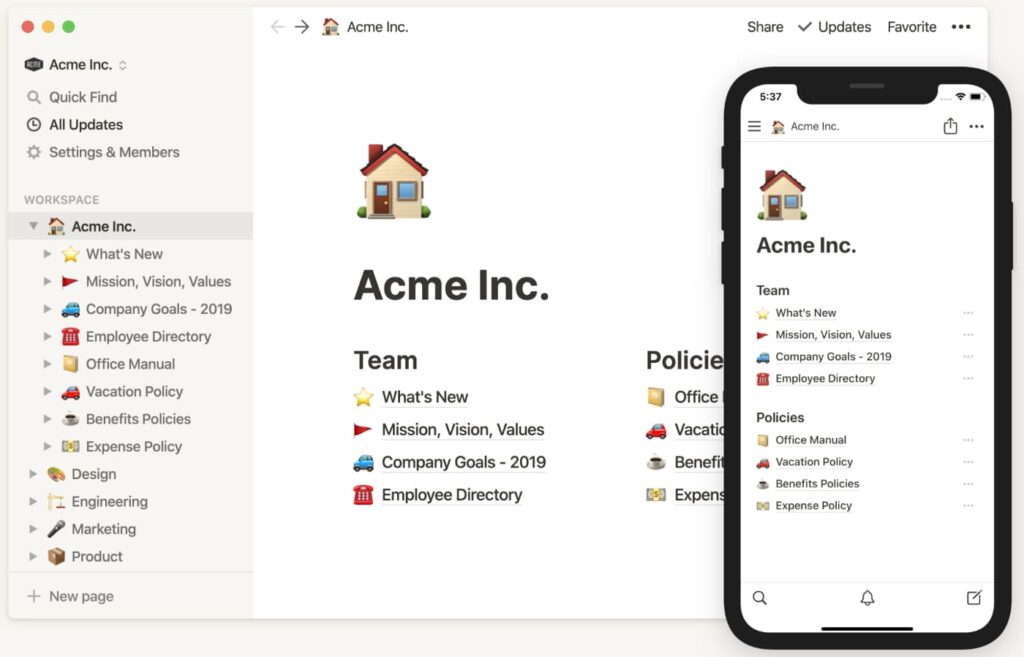
Best for: Internal documentation and team collaboration
Starting price: $8/month/user (individual) or $8/month/user (teams)
Notion is a software platform for content creation and project management. It is popular among teams of all sizes to create, manage and share content as well as to manage different projects. Its powerful databases and flexible content organization make it a good tool to create knowledge bases, although the lack of custom domain and white label features make it less suitable for customer-facing knowledge bases.
Pros
- Relational databases.
- Supports markdown.
- Unlimited storage.
- Simple sharing.
- Flexible content management features.
- Easy internal collaboration.
- Nested pages and databases.
- Wide range of content blocks.
- Chrome extension.
- Integration with Microsoft Teams.
Cons
- Cannot work offline.
- No custom domain.
- No white label.
- No customer portal.
- Learning curve.
- It can feel overwhelming.
HelpScout

Best for: External documentation, knowledge base, and customer support
Starting price: $20/month/user
HelpScout is a customer support system, or in other words, desk software, with three core features: knowledge base tool, shared email inbox and beacon widget. It gives business owners the tools to provide support to their customers both by email and through a live chat widget that can be placed on any website. With the knowledge base feature, which has an in-built search box, you can create informative knowledge base articles to reduce support tickets and provide users with the answers to their most common burning questions.
Additionally, HelpScout offers a range of collaboration tools, such as comments, drafts, approval workflows, and integration with other collaboration tools, that enable teams to work together effectively on content management in the knowledge base.
Pros
- Budget-friendly.
- Mailbox management.
- Custom search engine.
- Live chat widget for websites.
- In-app messaging.
- Automated workflows.
- Analytics and reporting.
- Customer feedback.
Cons
- Only two depth levels of content organization.
- Few customization options.
- Weak spam filters.
- Buggy document editors
ZenDesk

Best for: External help center, customer support and sales
Starting price: $49/user/month
Zendesk is an established support platform with all the tools a medium or large business might need to assist its customers and website visitors.
It is a leading SaaS knowledge base software that enables businesses to create and manage a centralized repository of knowledge for both customers and employees, with features such as customizable templates, version control, and a powerful search engine. One of the most commonly reported benefits of Zendesk is its community forums feature that allows businesses to create a space for their customers to engage with each other and share information.
Being primarily customer service software, Zendesk boasts multiple features, among which we can highlight its powerful knowledge base functionality. It is one of the most popular support solutions on the market, but if you mainly need a knowledge base solution, Zendesk might be both pricey and overwhelming. However, a big plus is that it is an all-in-one solution that allows you to create both external and internal knowledge bases.
Pros
- Content localization.
- Mailbox management.
- Desk software.
- Custom search engine.
- Live chat widget for websites.
- Analytics and reporting.
- Basic SEO settings.
- Self-service portal.
- Customer feedback.
- Machine learning bots and search.
- Community forums.
Cons
- Pricey solution for small businesses or freelancers.
- Steep learning curve.
- Overwhelming with too many features.
- One-way syncing with platforms like HubSpot service.
- Customers complain about a lack of support.
Slab

Best for: External and external content management
Starting price:$6.67/month/user
Slab is a content creation and management platform that lets you create and organize knowledge for your entire organization. It is a simple solution for any organization to create a nice-looking knowledge base with a simple sidebar where different sections are accessible.
Pros
- Affordable solution.
- Simple knowledge base content management.
- Custom domain (top plan).
- Usage analytics.
- Version history.
- Searchable information hubs.
- Integrations with popular apps.
Cons
- Limited storage.
- Few customization options.
- No SEO settings.
Archbee

Best for: External and internal knowledge management and collaboration
Starting price: $30/month (5 users)
Archbee is a documentation and knowledge management tool best suited to gather and present software knowledge. With Archbee, you can break up your documentation into separate spaces (public or private). Each space can contain whatever your team or your customers need: user guides, public or private portals, API docs, in-app contextual documentation, etc. You can create a comprehensive internal knowledge base with it.
Pros
- Custom domains with SSL certificate.
- Drag-and-drop organization of spaces and documents.
- Infinite document history.
- Powerful search feature.
- Document stats.
- Collaboration features.
- SEO settings.
- Custom CSS & JavaScript.
Cons
- Slightly pricey solution for freelancers.
- No free plan.
- Cannot work offline.
- Limit of 300 documents per space (not disclosed publicly!).
- Few customization options for non-techies.
- Limited storage.
GitBook

Best for: Internal and external software documentation and collaboration
Starting price: $6.70/month/user
GitBook is an easy-to-use documentation tool that allows teams to describe anything from products to APIs and internal articles. Its mission is to make it easy to plan, centralize and share technical knowledge both internally (between team members) and externally (with users and customers). GitBook can also be used to create a knowledge base.
Pros
- Custom domain even on the free plan (individual).
- Affordable documentation solution.
- Easy drag-and-drop interface.
- Self-service portal.
- Content feedback (Pro and Enterprise plans).
- Insights and analytics (Pro and Enterprise plans).
Cons
- Cannot remove Gitbook branding.
- Few customization options.
- Undefined file storage limits.
Intercom

Best for: Customer support, help articles and documentation
Starting price: $74/month
Intercom is an all-round customer support platform with support features across the board. With its live chat, ticketing solution, support articles and other core features, Intercom is the holy grail of customer support platforms. Intercom desk software allows creating a self-service portal that enables customers to access information and support resources without having to contact a support agent.
However, its high price makes it inaccessible for most SMBs or simply not worth it, especially if you only need to create an internal knowledge base.
Pros
- Live chat widget.
- Help articles (AKA knowledge bases).
- Staff workload management.
- Conversational bots.
- Customer feedback.
- Multilingual articles.
- Custom domain.
- Self-service portal.
- Actionable analytics and insights.
Cons
- No free plan.
- It can feel overwhelming.
- Extremely pricey for any small-to-medium business.
- Many features are sold as paid add-ons.
- Difficulty to migrate to other solutions.
- Some customers complain about their slow responses to support queries.
HelpCrunch
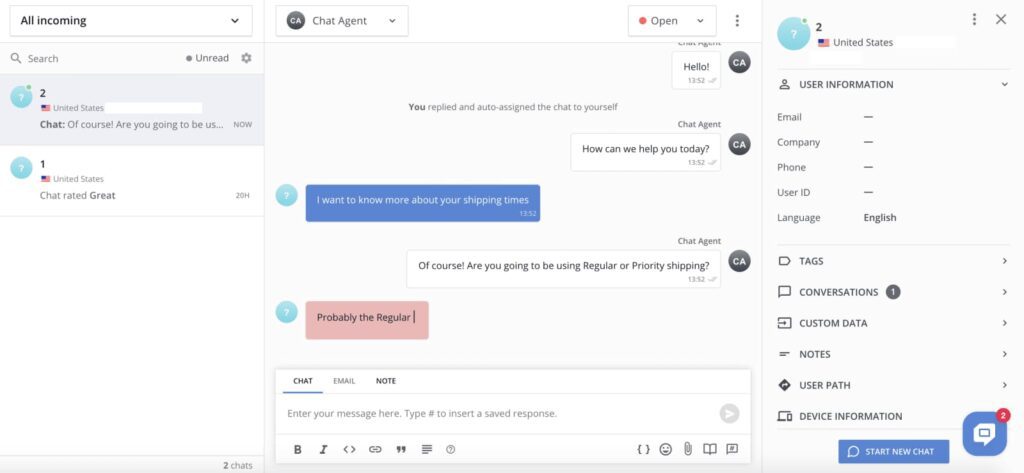
Best for: Customer support and external help articles
Starting price: $12/month/user
HelpCrunch is a customer communication platform that offers businesses the tools to provide assistance to customers and website visitors. With their live chat widget, their help desk solution and knowledge base tool, they position themselves as one of the most complete and affordable alternatives to Intercom or Zendesk.
HelpCrunch includes knowledge base software that enables businesses to create new and manage an existing knowledge base to provide self-service support for their customers. With the HelpCrunch knowledge base, you can create articles, organize them into categories, and use tags to make them easier to find. Overall, HelpCrunch customer service software provides businesses with a comprehensive information hub that can help improve customer satisfaction, reduce support costs, and streamline support operations.
Pros
- Affordable solution for SMBs.
- Easy to structure documentation.
- SEO setup features.
- Actionable insights and metrics.
- Custom domain.
- Self-service portal.
- Live chat and self-service widget.
- Multilingual knowledge hub.
- Smart search functionality.
Cons
- No desktop app.
- Not suitable for large enterprises.
- HelpCrunch branding on the lowest paid plan.
Heroic Knowledge Base

Best for: External content management
Starting price: $149 (one-time or yearly)
Heroic Knowledge Base solution is a powerful WordPress plugin that allows you to create a full-fledged self-hosted knowledge center. With instant search, article analytics, user feedback, email reports and more, Heroic Knowledge Base provides a curated knowledge base experience for your site visitors.
The Heroic external knowledge base software offers a range of features to make it easy to create, organize, and publish articles, as well as a powerful search engine and analytics tools to track content usage and performance. One of the standout features of Heroic Knowledge Base is its intuitive drag-and-drop interface, which makes it easy to create and edit articles without any coding or technical knowledge.
Pros
- WordPress-like flexibility.
- Built-in table of contents.
- User-based content restriction.
- User-friendly experience for visitors.
- Great customizable designs.
- Live search suggestions.
- Instant answers site widget.
- Search analytics.
Cons
- It’s not a standalone knowledge center solution, as it is WordPress dependent.
- No free trial.
- Pricing is above average for a WordPress plugin.
- Technical knowledge needed for basic set up.
- Support and updates for one year. After that, you need to renew the license.
- You’re responsible for the maintenance and updates.
- You need to pay for hosting separately.
Confluence
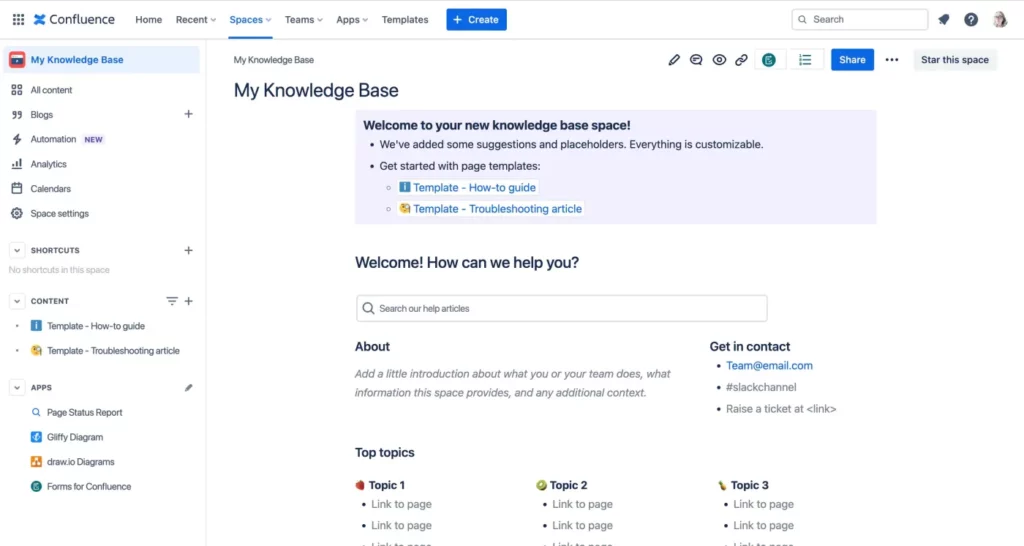
Best for: sharing knowledge, organizing content, and document collaboration.
Starting price: $5.16/user/month
Confluence is an online wiki-style collaboration workspace that assists users with improving effective teamwork and productivity. It allows users to create dynamic pages with all kinds of content, such as Whiteboards, Databases, and videos. Confluence’s features simplify the process of creating, organizing, and sharing information, all on a secure cloud platform. If you are looking for a centralized space to store and access data, share ideas, and maintain knowledge, Confluence might be the right choice for you.
Pros:
- Customize working space by creating an unlimited amount of pages.
- User-friendly interface.
- Create shared pages for all team or project members.
- Synchronize with your devices and stay connected with the team.
- Restrict access to particular pages and permit to read or comment on certain pages.
- A large number of templates and macros to simplify tasks.
Cons:
- Some needed features are only available as paid plugins.
- A steep learning curve.
- No real-time chat.
- The search feature doesn’t always function right.
That’s where our list of best knowledge base tools comes to an end. Having all that knowledge base software compared you will be able to make an informed decision and choose the right knowledge base software for your business needs.
Still struggle with your choice? You can try free knowledge base software to see if it is what you are looking for. Free knowledge base tools are a great option for small businesses, startups, or anyone looking to create a basic knowledge base without incurring any cost.
How to Implement a Knowledge Base for Your Organization
”Okay, now I know a lot about knowledge base software and how to choose the best one for my needs, but how can I implement a knowledge base for my organization?”, you might ask. Let us look at how to launch a knowledge base.
- Determine the purpose and goals of your knowledge base. Before you start building your knowledge base, even before you start choosing the knowledge base software, it’s important to define what you want to achieve, such as reducing support requests or improving client satisfaction, and ensure that your knowledge base has all the necessary features to meet these objectives.
- Identify the audience of your future knowledge base. Determine who the audience of your knowledge base will be, whether it’s customers, employees, or both. This will help you determine what kind of content to include in your knowledge base and how to structure it.
- Choose a knowledge base software. Select a knowledge base software that fits your needs and budget. Consider the factors we have mentioned earlier in this article. Make sure the chosen knowledge base software has all the necessary features and is user-friendly for both content creators and users.
- Create and organize content. Start creating and organizing content for your knowledge base. Identify common questions or issues that your audience may have and create articles or resources that address these topics. Organize your content into categories and subcategories to make it easy for users to find what they need. Make sure the search is working efficiently.
- Test and refine your knowledge base. Test your knowledge base with a small group of users and gather feedback. Use this feedback to refine your content and make adjustments to your knowledge base as needed.
- Launch and promote your knowledge base. Once your knowledge base is ready, launch it and promote it to your audience. Encourage users to provide feedback and suggestions for improvement.
- Monitor and update your knowledge base. Monitor usage and performance metrics for your knowledge base, such as the number of views or searches on specific articles. Use this information to identify areas for improvement and make updates to your knowledge base or customize your knowledge base software as needed.
Wrapping Things Up
As business and website owners, it is essential to have a knowledge base software to help you manage your business efficiently. With the right knowledge base software, you can store all of your company’s valuable information, whether internally or externally, in one place and make it easy for team members and users to access whenever they need it. It can be a valuable asset for any organization, improving efficiency and collaboration, and reducing support queries and costs. By making information more accessible, a knowledge base can help your team members and organization grow and succeed.
In this article, we have provided an overview of some of the best knowledge base software options available on the market, empowering you to make an informed decision that meets your business needs. Since the FuseBase knowledge base ranks number one on our list, we recommend beginning your evaluation process with this platform as a starting point.
Create your perfect Knowledge Base Software with our experts
Learn how FuseBase can help you build a perfect knowledge base here.
Disclaimer
Parties other than FuseBase may provide products, services, recommendations, or views on the FuseBase site (“Third Party Materials”). FuseBase is not responsible for examining or evaluating such Third Party Materials, and does not provide any warranties relating to the Third Party Materials. Links to such Third Party Materials are for your convenience and do not constitute an endorsement of such Third Party Materials.
Found it useful? Share the article with your community
Subscribe to our blog!
Get weekly tips and insights on how to grow your business

